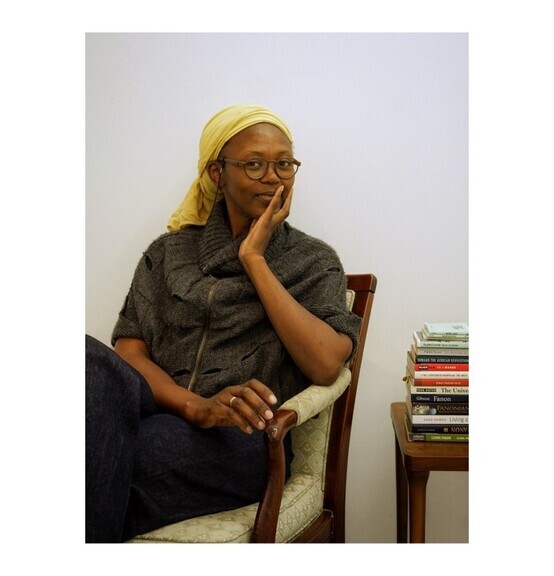Anawana Haloba
Anawana Haloba (Livingstone, Zambia) Lives and works in Oslo and Livingstone. She was educated at the Evelyn Hone College of Applied Arts in Lusaka, Zambia and completed her BA at the National Academy of Arts Oslo in 2006. Haloba is a graduate of the Rijksakademie van Beeldende Kunsten in Amsterdam, the Netherlands and an alumnus of the Smithsonian Artist Research Fellowship in Washington DC. She is currently completing her PhD at KMD, University of Bergen. Anawana Haloba’s artistic practice is an ongoing investigation process into positions of different societies within varied political, social, economic and cultural contexts and ideological and post-independence frameworks. Her artistic practice is symbiotically linked to and through her preparatory exercise in drafting poetry in the forms of sketches from which, the artist abstracts to performative based artworks within moving image, installation, and sound, while creating situations where the material culture of any given place can be probed and reconsidered within the scheme of rapidly shifting contemporary subjectivities. Recently, her research investigates the epistemologically oppressed kowledges and technologies through methods of listening and other oral understanding to activate (re)pair and opacity. Haloba’s work has featured in both solo and group exhibitions, including Centre Pompidou, Paris, France; Oslo Kunstforening, Norway: GAMeC, Bergamo, Italy; SKMU Sørlandets Kunstmuseum, Kristiansand, Norway; National Museum of African Arts Smithsonian Institute, Washington DC, USA; the Rauma Biennale, Finland; ZKM Museum of Contemporary Art, Karlsruhe, Germany; Museum Berardo Collection, Lisbon, Portugal; la Biennale di Venezia, 2009; Sydney Biennale 2008, Australia; Manifesta 7, Bolzano, Italy, the Sharjah Biennial 08, 11 and 14th edition in 2019 in Sharjah, UAE, as well as the biennales in Sao Paulo (2016), Shanghai (2016) and Lyon (2017). the Bucharest Biennale, 2021, Fellbach triennial 2022. She co-founded Livingstone Office for Contemporary Arts (LoCA) in 2014. LoCA is an artist-initiated non-profit library, research centre and collective/collaborative platform for reflections and an experimental think-tank, exploring histories (colonial histories, social and political histories and their legacies) and how they relate to language and contemporary art.
What I am working on now / current interests
At the moment, I am investigating the epistemologically oppressed knowledges and technologies through methods of listening and other oral understanding to activate (re)pair and opacity. In this processes I consider other forms of citation through cultures to raise other awareness of nonlinear and nonhierarchical methods of sharing.
Pedagogical approach and expectations of students
I look forward to engaging with you in an “Act of Beginning”, Stanka Radovic’s essay “The Birthplace of Relation: Edouard Glissant’s Poetique de la Relation: For Ranko” opens with this proclamation:
“To begin is an act of gravity and an act of responsibility, especially if a new world is about to begin. I mean this literally: to begin a world is to ground it, to pull it down – with gravity – from an area of flux onto the firm ground where any subsequent creation can rest its feet. To begin a world is also to render it responsible” (Radovi and Glissant 2007).
The above quote is a motivation for grounding and placing a footing on what we will achieve collectively, to engage in a process in which to develop and suggest new methods or other awareness of thinking. To be able to read through different philosophies, cultures, and methodologies and engage with critical thinking helps us understand the world in which we live without forgetting that we are also centers in this world. "World" on the premise that situations and experiences are interconnected and are married to other things or people. Things and people come with histories based on background, environment, and heritage, representing different traumas, love, and understanding embedded in the human experience. Teaching and learning are interchangeable processes of undoing the one incomplete story to create a whole one. And an opportunity to reconsider, suggest by evoking a comparative approach to existing knowledge. You are a value in this process of sharing to develop ourselves and this is a commitment I bring to you through group tutorials and one-to-one. Therefore, If I could inspire students by exposing them to other different cosmological understandings through texts, film, music and other ways of thinking and being, to understand the ones close to them- that's an achievement commitment I am passionate about. I advocate a methodology of teaching text and theory with the help of film and music and vice-versa while seeking to bring about other sensibilities and understanding towards creativity and make it accessible to students so they can apply what they have learned to their art practices.
